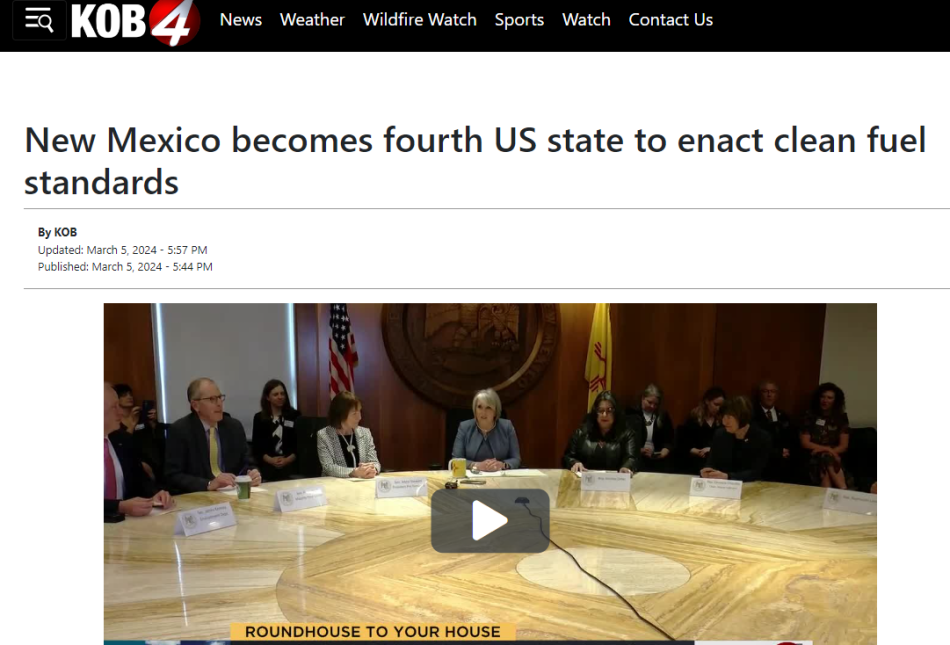Opinion piece: Fuel standard will increase gasoline prices

The following appeared in Santa Fe New Mexican on August 10, 2024.
![]()
For several years Gov. Lujan Grisham and the most liberal Democrats in New Mexico’s Legislature pushed to get a so-called “Clean Fuel Standard” through the Legislature. In the 2024 session they finally succeeded with the passage of HB 41 which mandated adoption of such a standard.
That bill passed the House narrowly on a 36-33 vote with several Democrats joining Republicans in opposition.
To be clear, the Clean Fuel Standard has not been implemented just yet. So, it isn’t impacting what New Mexicans pay at the pump, at least not yet. The Rio Grande Foundation attended a series of recently completed Advisory Committee Meetings. A series of actions will take place before the law takes effect in Spring of 2025.
Part of the success advocates had in getting the bill passed this session involved the State’s Environment Department throwing their weight behind the issue and making claims like, “There is no statistically significant data that ties a clean fuel standard to price increases at the pump in states that have already enacted clean fuel standards.”
Even California and Oregon are more honest about the true cost of these regulations. California recently released a study that found the state’s attempt to make its standard more stringent would increase the cost of gasoline by 47 cents per gallon in 2025 and 52 cents per gallon in 2026. Oregon has an entire webpage called “Annual Cost of the Clean Fuels Program,” admitting that these policies do indeed increase costs for consumers.
Using modeling provided by Always on Energy Research, we found that New Mexicans will indeed pay substantially more for gas and diesel under this law. Using a formula provided by the Oregon Department of Environmentally Quality, by 2040, New Mexico’s “clean fuel” regulations will cause gas prices to be 45 cents per gallon higher than they otherwise would be. Diesel prices will be 52 cents higher.
Our new policy brief outlines the evidence. By 2030, New Mexico households will pay an additional $340 for gasoline while the additional per household cost of diesel will be $327. Diesel is primarily used in trucking and heavy industry, so these costs will likely impact New Mexicans in the form of higher prices for goods and services. By 2040, the average household in New Mexico will pay an additional $510 for gasoline and $490 for diesel fuel because of the clean fuel standard.
Is the additional expense worthwhile for the slight reduction in CO2 emissions being promised? It is hard to say especially when China (already by far the world’s biggest emitter of CO2) is rapidly increasing its emissions and shows no signs of reversing course. But, without honest data from New Mexico’s Environment Department or the law’s supporters regarding the law’s impact on gas prices, it is hard to see how the current Legislature could have had a real debate to begin with.
What we DO know is that many legislators rightly stated there would be price increases foisted on New Mexicans by a “clean fuel standard” law in 2024 and by prior versions of this bill. Unfortunately, the Lujan Grisham Administration prefers to act unilaterally, through unelected bodies or, barring that by ramming legislation through a generally sympathetic Legislature acting with at best partial information.
Unless New Mexico’s Legislature seriously considers the potential for the “Clean Fuel
Standard” to increase costs for consumers dramatically (and soon) it is hard to see the law being abandoned or revised. Perhaps the departure of this Gov. in two years will lead to a reevaluation of the law on more honest terms, but it is far more likely that life will become even more expensive (unnecessarily so) in one of the very poorest states in the nation.
Paul Gessing is president of New Mexico’s Rio Grande Foundation. Isaac Orr is a founder and Vice President of Research at Always On Energy Research
